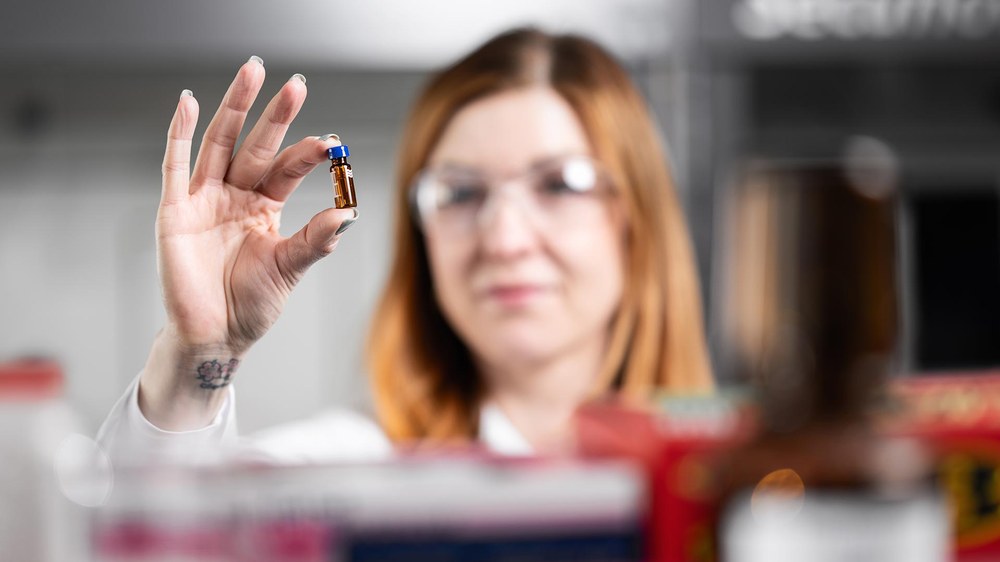The harmful effects of air traffic on the climate must be greatly reduced in the future - this applies both to the emission of carbon dioxide (CO2) in exhaust gas and the so-called non-CO2 effects of aviation, which are caused by contrails, among other things. In the "Sustainable Aviation Fuels based on Advanced Reaction and Process Intensification" (SAFari) project, a consortium of research institutes and industrial partners led by the Fraunhofer Institute for Solar Energy Systems (ISE) is therefore developing a new, innovative process: a sustainable synthetic liquid fuel (Sustainable Aviation Fuel, also known as SAF) based on methanol is intended to completely replace fossil kerosene in the future. At the same time, the aim is to increase process efficiency during production.
Throughout the entire process, the Institute of Combustion Technology will optimise the existing analytical methods and evaluate and characterise the interim project samples and the final fuel using the Prescreening method developed at the institute. The Institute will also contribute its experience in the approval of the fuel.
Partners along the entire value chain have joined forces in the "Sustainable Aviation Fuels based on Advanced Reaction and Process Intensification" (SAFari) project. The consortium includes ASG Analytik-Service AG, BP Europa SE, Clariant AG and the German Aerospace Centre (DLR). Associated partners such as Südzucker AG and the Bundesverband der Deutschen Luftverkehrswirtschaft e.V. (BDL) are important stakeholders who provide the necessary raw materials or are potential users. The SAFari project has been funded by the Federal Ministry for Digital and Transport Affairs (BMDV) for a period of six years since December 2022.
Building a pilot plant and a whole new process route
In the SAFari research project, the partners will produce and test sustainable aviation fuel from methanol in a pilot plant in order to subsequently obtain full market approval from the American Society for Testing and Materials (ASTM). To date, there is no fully integrated pilot or demonstration plant for the methanol route in operation that covers the entire process chain. The future pilot plant will be developed and operated by Fraunhofer ISE and will combine all the functionalities required for the subsequent technical process in order to ensure that the expertise gained can be transferred to an industrial scale.
The conversion of carbon dioxide and hydrogen to methanol as a feedstock has several advantages: green methanol can be produced worldwide at locations with a high availability of renewable energy. In addition, liquid methanol can be transported efficiently, provided a suitable infrastructure is in place. The project aims to demonstrate that a higher blending rate can be achieved with methanol-based SAF. Currently, ASTM-approved SAFs allow a blending rate of up to 50 %. The SAFari project is aiming for a quota of up to 100 %.
Innovative process integration and reaction technology
The project participants will take an innovative approach to some of the process steps in the project: "We want to prove that synthesising aviation fuel based on methanol makes it possible to reduce hydrogen requirements and achieve high overall process efficiency on an industrially relevant scale. The focus will be on innovative reaction technologies along the various sub-processes and intelligent material and energy integration. This should help to increase the SAF yield and reduce production costs," explains Dr Ouda Salem, SAFari project manager and group leader Power-to-Liquids at Fraunhofer ISE. "The SAFari approach can become a disruptive technology that has the potential to completely replace the fossil process and significantly reduce the carbon footprint of aviation fuels in an economically viable way," Salem continues.
SAFari | Sustainable Aviation Fuels based on Advanced Reaction and Process Intensification (SAFari) |
|---|---|
Duration | December 2022 to November2028 |
Project volume | 15,83 Mio. € |
Funding | 14.93 Mio. € (funding share 94.3 %) |
Participants |
|
Associated partners |
|


